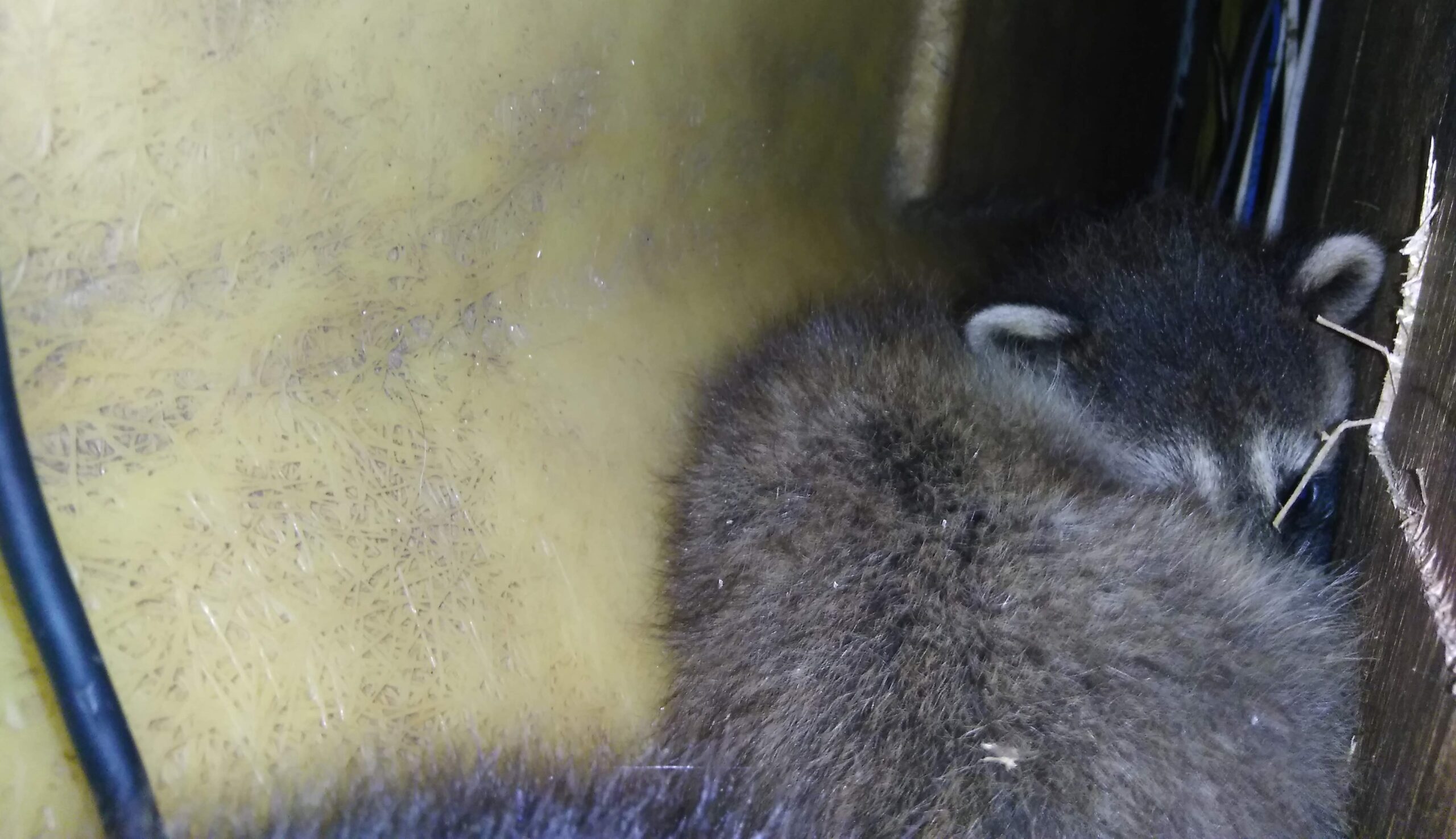“Raccoons have been known to be great hitchhikers.” According to Bill Dowd, CEO of Skedaddle Humane Wildlife Control
We’re all cautious of the hitchhiker our mothers warned us about. The innocent looking guy on the side of the road with unknown intentions. But what about the hitchhiker you don’t see, the threat you don’t recognize? The masked bandit that is waiting to catch a ride across country stowed away in the back of your pickup truck or trailer. This hitchhiker is none other than the raccoon, who sneaks a ride in your vehicle creating several problems down the road.
Why Should You be Concerned about the Hitchhiking Raccoon?
Anyone who has had first-hand experience with raccoons know that these animals are clever and crafty. And for many people it will come as no surprise that if a raccoon wants to get around town or the country, they would have no problem hitching a ride on the back of a truck, trailer or pickup. While this may not seem like an obvious problem, the concern for city authorities and municipalities around the country is that hitchhiking raccoons are often transporting more than just themselves. These masked bandits may be carrying hitchhikers of their own. In 2016, scientists discovered that a rabid raccoon travelled more than 500 kilometres from southeastern New York State to Ontario and was responsible for the first rabies outbreak in the area in more than a decade.
How do They Know the Rabid Raccoon Hitchhiked from New York State?
The blame for the rabies outbreak in Ontario in 2016 has been laid squarely at the feet of an unknown New York State raccoon that most likely crossed the border in a transport truck from the U.S. And that’s not just guesswork and speculation, the theory is backed up by science. Genetic analyses of the virus found in infected raccoons showed that the strain of the virus outbreak in Ontario was closely related to a strain from south-eastern New York state, and not one found closer to the border.
But surely the raccoon could have crossed the border under its own steam and not as an illegal hitchhiker. Yes, the raccoon could have walked over the border, but bringing the rabies virus with it would not have been easy. The raccoon route across the border is defended against rabies by thousands of edible vaccine baits that are incredibly effective in keeping the virus away from healthy Canadian raccoons. In order to control the outbreak in 2016 and make sure that the virus could not establish itself in the local wildlife population, provincial officials had to drop rabies vaccine bait by hand and by helicopter.
What Should You do About Potentially Infected Raccoons on Your Property?
Because raccoons are quite skilled, they have adapted very well to living alongside people and know how to survive in an urban environment, but that does not make them human friendly and raccoons should always be approached with care. According to Bill Dowd, “you should be especially careful around any raccoon that is acting strange or aggressive, or one that doesn’t seem afraid of a nearby human. If you hear noises in your attic or chimney call a professional to get the animal removed.”
If you have ever had to deal with raccoons in your attic or chimney, you will know that they are very good at solving problems. There are few obstacles in nature they are unable to overcome. Even in more challenging urban environments, and despite our best efforts, they can find a way around many of the obstacles that we place in their path. Raccoons can scale walls, rip up soffits, open garbage bins, tear poorly secured screens off windows and chimney’s, and find their way into crawl spaces. Once a raccoon has gained entry into your home, the only way to deal with the problem safely and humanely is to call in a professional raccoon removal expert, and preferably a company that specializes in urban wildlife control and prevention.
While the rabies virus is rare in Canada, there is always a slight possibility that the raccoon on your property could be infected, especially if it has travelled from another city or town. If you do encounter raccoons on your property, Bill Dowd’s advice is to take the following precautions:
- Never try to handle the problem on your own
- Do not attempt to trap or remove the raccoon by yourself, this usually does not end well and both you and the raccoon could get hurt
- Avoid any contact with the raccoon because it could potentially be carrying a disease like rabies
- Call a professional raccoon removal and control company to tackle the problem immediately
- When they arrive, leave the job in the capable hands of the professionals; they have the correct training, equipment, and expertise.
Humane Urban Wildlife Removal
Bill Dowd also warns that “if a rabid raccoon scratches or bites a human, it can transmit rabies to them. This is why it is important to stay away from DIY raccoon removal and always contact professional companies to tackle the problem.”
All Skedaddle Technicians are trained and equipped to safely remove raccoons from your home. They will identify all raccoon entry points, looking for places where their strong, nimble-fingered paws have caused damage.
Once the raccoons have been evicted from your home, the Skedaddle Technicians will clear and clean any contaminated material. It is essential that this part of the job is done by a professional because raccoon feces are often infected with a type of roundworm (Baylisascaris) that can cause serious illness if accidentally ingested. We will also advise you on your repair and attic restoration options.
If you hear things going bump in the night and suspect that you have a raccoon trespasser in your attic, you need to act quickly and call a professional urban wildlife control expert, like Skedaddle Humane Wildlife Control, to safely remove the raccoon.



